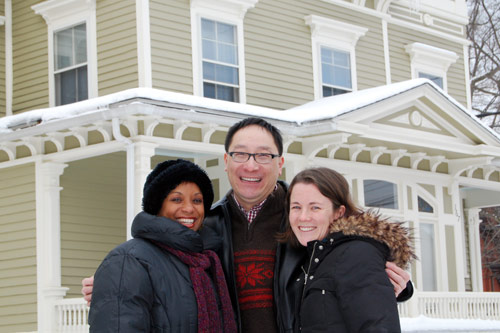Carnegie Foundation Honors Wesleyan’s Civic Engagement

The Carnegie Foundation for the Advancement of Teaching recently recognized Wesleyan for its continued involvement in community outreach by selecting the university as a recipient of a 2008 Community Engagement Classification.
The university was among 119 institutions (and among two in Connecticut) that received this classification for 2008. The foundation initiated the community engagement classification in 2006. Visit this page for more information and a list of the selected institutions.
“The significance of Wesleyan receiving the Carnegie Foundation Community Engagement Classification is major in light of this historic moment we experienced this week in our country,” said Sonia BasSheva Mañjon, vice president for diversity and strategic partnerships. “We have just sworn in a Commander in Chief of this country who believes intimately in service and engagement. As [President Obama] stated during our commencement ceremony last year ‘our collective service can shape the destiny of this generation’; we are educating that generation he speaks of and to. Providing our students with curricular and extra-curricular opportunities to participate in community service and engagement exemplifies our commitment as an institution of higher learning to not only give back, but to engage with our local, national and international communities.”.
The community engagement classification is an elective designation, therefore Wesleyan had to submit a thorough application to the foundation detailing its community engagement efforts. The school has a long history of promoting community service and offering opportunities for students to serve others.
“Having the elective classification on Community Engagement by the Carnegie Foundation means that we have been evaluated and we have met benchmarks as an engaged campus in both curricular engagement and outreach and partnerships,” said Frank Kuan, director of community relations at Wesleyan’s Center for Community Partnerships (CCP).
“This recognition signifies that we are on the right track. Having gone through the application process, we also know our areas of challenges and opportunities, and these will continue to guide our ongoing civic engagement endeavors,” Kuan said.
Established in 2003, the CCP is comprised of the Service-Learning Center (SLC), the Office of Community Service and Volunteerism (OCS), the Office of Community Relations (OCR)–and, most recently, the Green Street Arts Center. Wesleyan’s strategic plan for 2005, titled “Engaged with the World,” includes a section on External Relations, in which Wesleyan’s commitment to the external community is documented. The strategic plan states, “… We believe that our engagement in the community is important for the social good and the quality of life in our community. We also believe that as Middletown thrives, so will Wesleyan.” As a testament to the university’s ongoing conversation with the community, the CCP has an advisory board consisting of 16 members representing the community and the university and meets four times throughout year to discuss community relations issues.
Wesleyan students regularly volunteer at local schools, churches and other non-profit institutions including the North End Action Team and the Oddfellows Playhouse. The university has specifically partnered successfully with the Middlesex United Way to raise money that goes directly to local programs in the region.
“[The Middlesex United Way and Wesleyan University] have been partners in many successful ventures including conducting a needs assessment, working to prevent homelessness and raising hundreds of thousands of dollars to benefit people most in need in the greater Middletown region.” said Kevin Wilhelm, Executive Director, Middlesex United Way.
“I have also witnessed first hand the collective power of students to bring real solutions to tough issues as a result of their participation in the community research seminar,” he said.
According to Suzanne O’Connell, director of the campus Service Learning Center and Chair and associate professor of Earth & Environmental Sciences, service-learning at Wesleyan began 10 years ago.
“Being recognized by the Carnegie Foundation as an Engaged Community shows how readily the faculty, students and administration incorporated service-learning into the curriculum, despite the added expense of time and money.” O’Connell said.
“Of course, it’s difficult to argue with an academic process that allows students to apply what they are learning to a non-academic environment, thus enhancing their learning and providing a benefit for the community. Many students find this a life-changing experience,” she said.

